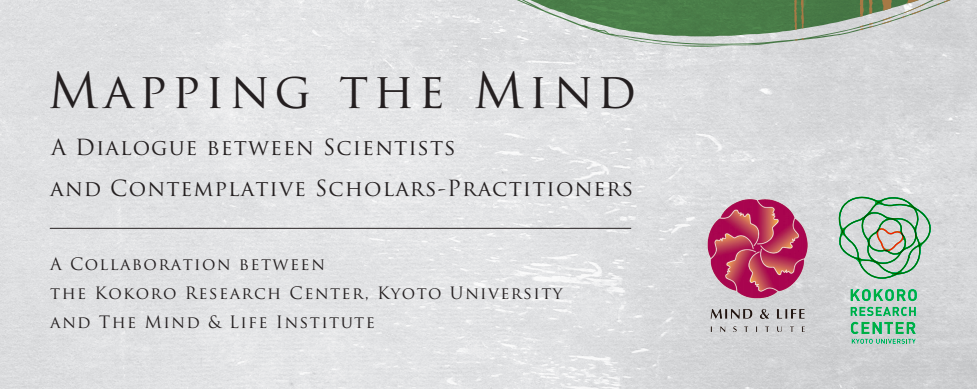Filmed during Mind & Life Institute’s “Mind and Life XXIX: Mapping the Mind” on April 11, 2014.
Remarks by His Holiness the 14th Dalai Lama
Mind in Early Buddhism
SPEAKER: Yoshiro Imaeda
Mind has been one of the subjects to which Buddhism has devoted its utmost attention for the last 25 centuries. In this field, no one has laboured with greater industry and acumen than Buddhist thinkers, starting with its founder, the Buddha himself. This is clearly reflected by the presence of numerous passages contained in the earliest Buddhist texts such as Suttanipāta and Dhammapada. Those texts contain profound introspective inquiries into the nature and processes of mind. According to them, the mind is not an entity, remaining the same over the course of life, but something that is constantly modified by external stimuli and goes through perpetual and inherent change. The intermittent coming and going of mental pulsations is often compared with the movement of a monkey: “They seize (and) let go like a monkey seizing and releasing a branch.” This introspective heritage of the East is now held in high esteem in modern Western psychology and neuroscience. While the current mutual discussion and collaboration is welcome, it should not be forgotten that Buddhist inquiries into the nature and process of mind have never been of scientific nature or for scientific purpose per se. According to Buddhism, the mind is regarded as the guide or governor of the individual, under the Platonic simile of charioteer. If the nature of mind has been so minutely and subtly analyzed and investigated by Buddhist scholars, it is above all for the self-control and governance of sense-impressions and sense-desires, which is the prerequisite for attaining the final goal of Buddhism: nibbana (nirvāņa). In the pursuit of mapping the mind, it seems important to follow the “Middle Path”: the balance between the purely scientific investigation and the Buddhist aim of self-control.
Taking Buddhist Psychology and Contemplative Perspectives Seriously
SPEAKER: Thupten Jinpa
This presentation focuses on the key question of what classical Buddhist psychology, especially Abhidharma, and associated contemplative practices can contribute towards “Mapping the Mind.” Taking as examples a few key factors from the Abhidharma taxonomy, Jinpa demonstrates how Abhidharma’s definition of cognitive and affective processes reveal the specific functions of these processes as well as their dynamic relationship to other mental factors. Jinpa also shows how critical examination of the key Buddhist contemplative practices—mindfulness, compassion, and forbearance—can also help reveal insights pertaining to interrelations between various mental factors. The presentation concludes with observations of how the Abhidharma and Buddhist contemplative perspectives can be brought as key partners in mapping the mind, an endeavor that is, by its very nature, bound to be a multi-disciplinary enterprise.
Change Your Brain by Transforming Your Mind: Neuroscientific Studies of Meditation
SPEAKER: Richard Davidson
This talk presents an overview of studies conducted in our laboratory over the past six years on neural changes associated with different forms of meditation. Distinctions among three major forms of meditation practice will be made: Focused Attention; Open Monitoring; and Positive Affect Training. These different forms of meditation have different neural and behavioral effects. From the perspective of Western neuroscience, different forms of meditation can be conceptualized as mental training to promote the regulation of emotion and attention. Data from studies on long term meditation practitioners as well as those with shorter durations of training will be highlighted. In addition, some longitudinal studies that track changes over time with meditation practice will be reviewed. In addition to the neural changes that have been observed, this talk also summarizes changes that have been found in peripheral biology that may modulate physical health and illness. The central brain circuitry of emotion is especially implicated in peripheral biological changes that have consequences for health. The overall conclusions from these studies is that one can transform the mind through meditation and thereby alter the brain and the periphery in ways that may be beneficial for mental and physical health, and for well-being.
Group Discussion and remarks from His Holiness the 14th Dalai Lama
MODERATOR: Arthur Zajonc
INTERPRETER: Thupten Jinpa
PANELISTS:
Jay Garfield
Roshi Joan Halifax
Atsushi Iriki
Barry Kerzin (Venerable Tenzin Choerab)
Shinobu Kitayama
Junko Tanaka-Matsumi
Shigefumi Mori
Makoto Nagao
Shinsuke Shimojo
Participants

Thupten Jinpa, PhD
Board Chair, Mind & Life Institute

Richard J. Davidson, PhD
William James and Vilas Research Professor of Psychology and Psychiatry and Founder & Director of the Center for Healthy Minds, University of Wisconsin-Madison. Founder and Chief Visionary for Healthy Minds Innovations, Inc.

Arthur Zajonc, PhD
Mind & Life Institute



